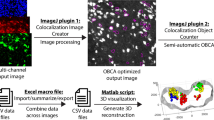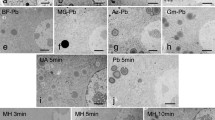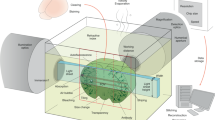Abstract
THE accurate localization of an enzyme at the cellular level by a cytochemical technique requires a full investigation of artefacts due to diffusion of enzyme, reagents and reaction products. The classical superimposed-section technique does not have a sufficient resolving power to evaluate diffusion artefacts over the small distances inside a cell. A technique has been developed which enables the enzyme in small areas inside a cell in a tissue section to be inactivated. In this way diffusion during a cytochemical reaction can be investigated. The method makes use of the enzyme-inactivating action of the long wave-length ultra-violet light obtained from a glass-jacketed 250-watt B.T.H. mercury lamp. This is focused on the section mounted in water between two coverslips by an 8-mm. apochromatic objective. A mask in front of the lamp acts as the light source, and in this way slits or patterns of small holes can be focused on the section.
This is a preview of subscription content, access via your institution
Access options
Subscribe to this journal
Receive 51 print issues and online access
$199.00 per year
only $3.90 per issue
Buy this article
- Purchase on Springer Link
- Instant access to full article PDF
Prices may be subject to local taxes which are calculated during checkout
Similar content being viewed by others
Author information
Authors and Affiliations
Rights and permissions
About this article
Cite this article
BELL, L. A Critical Technique for Enzyme Cytochemistry. Nature 178, 201–202 (1956). https://doi.org/10.1038/178201a0
Issue Date:
DOI: https://doi.org/10.1038/178201a0
Comments
By submitting a comment you agree to abide by our Terms and Community Guidelines. If you find something abusive or that does not comply with our terms or guidelines please flag it as inappropriate.



